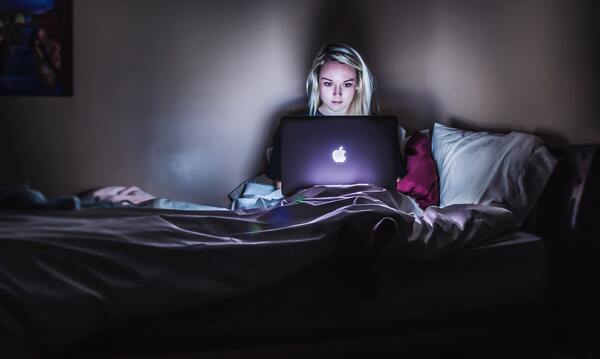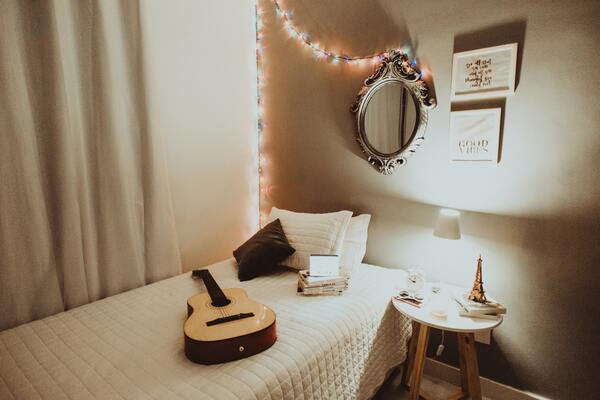The phrase “lights out” may have been used to signal bedtime when you were a child. But turning out the lights before bed is much more than just a common bedtime proverb. In actuality, your health may be impacted by whether you choose to turn off the lights or leave them on. So, why is it better to sleep with the lights off? Yes.
Side Effects Of Sleeping With Lights On
Exposure to light during sleep makes it difficult for your brain to achieve deeper sleep. Your ability to enter deeper stages of sleep is negatively impacted by the amount of light or shallow sleep you get at night.
The following side effects of light exposure and lack of deep sleep have also been linked, in addition to conditions that directly impact your brain.
Depression
Sleeping with the lights on has been linked to depression. Blue light from electronic devices may have the worst effects on your mood.
Moodiness and irritability can also result from a lack of sleep. Children who don’t get enough sleep may be more hyperactive.
Obesity
One study Trusted Source on women found that obesity was more prevalent in those who slept with television or light on.
Additionally, there was a 17 percent higher chance for study participants to gain 11 pounds in a year. When compared to light sources inside the bedroom, lights outside the room were found to be less of a factor.
One factor in the lack of sleep-induced obesity could be food intake. Studies Trusted sources have shown that the less sleep you get, the more food you’ll likely eat the next day. This may also have an impact on when you eat; eating late at night may result in weight gain.

Accidents
You are less alert the following day if you don’t get enough good sleep. If you operate a vehicle or other type of machinery, this could be particularly risky. Older adults may also be more prone to falls Trusted Source.
Increase Risk Of Chronic Illnesses
If the light continues to interfere with your sleep in the long term, you could be at an increased risk of certain chronic illnesses, whether you have obese or not. These include high blood pressure (hypertension), heart disease, and type 2 diabetes.
Increase Blood Pressure
Since melatonin also helps to control blood pressure, it is possible for your blood pressure to increase if you are exposed to light during the night.
People who slept with lights off had significantly lower blood pressure than those who were exposed to excessive amounts of light at night, according to research by Chronobiology International.
Benefits Of Sleeping With Lights Off
Easier To Fall Asleep
Turn off all the brighter lights and leave a soft bedside light on as you get ready for bed. Darkness encourages relaxation and stimulates the melatonin hormone, which makes it easier for us to fall asleep.
It is best to turn off all lights once you are in bed, though. Even while we are sleeping, our brain senses light through the eyelids and is no longer able to produce melatonin because it confuses night and day.
Dispel Depression
According to research conducted at Ohio State University Hospital, sleeping near a light source disturbs the circadian rhythm. In other words, our body doesn’t know when to go to bed, and our circadian rhythm is off, leading to mental imbalance and potential increased risk of developing depression.
Good For Your Health
Numerous studies have revealed that sleeping with a light on may cause a 50% increase in body weight (although dieticians and nutritionists never advise it). Light affects the body’s biological rhythms and metabolic parameters, which causes this.
Offer Relief To The Eyes
Your eyes will benefit from and be protected by getting good sleep with the lights off. It should come as no surprise that kids who typically sleep with a light on have more myopia problems.
Additionally, developing healthy sleeping habits is crucial for young children and infants because they have a direct impact on their physical and mental development.
Reduce The Chance Of Diabetes
A new study conducted at the Northwestern University Feinberg School of Medicine in Chicago and published in the scientific journal Sleep, reveals that having a light on during sleep can have a negative impact on diabetes.
In fact, it has been discovered that exposure to light while sleeping may have an impact on insulin resistance.
How Darkness Influences Sleep
Sleep requires complete darkness. A crucial cue to the body that it is time to rest is the absence of light. When the body is exposed to light at the wrong times, the biological system that controls sleep-wake cycles, known as the “internal sleep clock,” is altered in ways that affect both the quantity and quality of sleep.
The brain’s pineal gland secretes melatonin, also referred to as the “darkness hormone” or the “sleep hormone.” By informing the brain that it is time for rest, melatonin has an impact on sleep. This signal aids in starting the body’s physiological sleep-initiating processes; muscles start to relax, drowsiness feelings intensify, and body temperature falls.
Melatonin levels naturally increase as darkness falls in the early evening and rise for the majority of the night before peaking around three in the morning.m. Then, in the early morning, melatonin levels decrease and stay low for the majority of the day.
The body’s melatonin levels naturally rise in the evening, but exposure to light prevents this from happening, delaying the onset of the sleep-wake cycle and actual sleep.
What If I Can Only Sleep With The Light On
Despite the fact that many adults also keep lights on, some kids find it comforting to do so. Maybe you’re used to leaving the TV or bedside lamp on at night. You could also check your phone or tablet.
When you’re used to having lights on, it can be challenging to sleep without them. Use a small red-emitting nightlight at first, then stop using it once you’re used to the darkness.
It’s been found that red nightlight bulbs don’t have the same detrimental effect on melatonin production as other colored bulbs.
It’s also important to incorporate other healthy sleep habits into your routine so you won’t notice the lack of lights:
- Use blinds that darken rooms.
- In the hours before bed, start turning down the lights in your house.
- Set your clocks to go to bed and wake up at the same time each day.
- Do not use electronics in your bedroom.
- If you must check on an electronic device, wear blue light-blocking glasses to retain melatonin.
- If possible, avoid taking naps during the day.
- Exercise earlier in the day, preferably in the morning or late in the afternoon.
